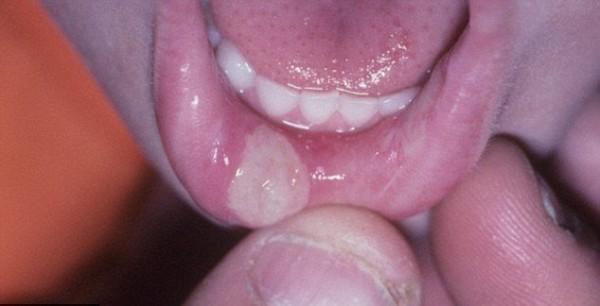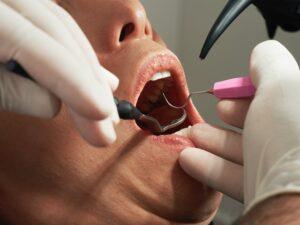Mouth ulcers are also known as canker sores, they are tiny, painful lesions that occur in the mouth or at the base of the gums. They can make eating, drinking, and conversing difficult. Mouth ulcers are more common in those with dentures, poor dental health, adolescents and persons who have a family history of mouth ulcers.

 My guess is that everybody gets a mouth ulcers from time to time. We also known a mouth ulcer as an aphthous ulcer or, in American English, a canker sore. A mouth ulcer is an open sore inside the mouth, or rarely a break in the mucous membrane or the epithelium on the lips or surrounding the mouth.
My guess is that everybody gets a mouth ulcers from time to time. We also known a mouth ulcer as an aphthous ulcer or, in American English, a canker sore. A mouth ulcer is an open sore inside the mouth, or rarely a break in the mucous membrane or the epithelium on the lips or surrounding the mouth.
They can be small, round and painful sores in the mouth, which can really interfere with eating and brushing your teeth.
These sores can have a red appearance with a whitish centre. Two common types are mouth ulcers (aphthous ulcers or canker sores) and cold sores (fever blisters, oral herpes).
Viruses cause cold sores around the lip, however. Let’s look at the best ways to relieve this painful condition.
Some foods can really trigger pain, like chilli or pepper. I have found that mouth ulcers come in crops of up to four or five, which last anywhere from a few days to a week.
Some people experience them frequently, such as weekly and others may just get the occasional ulcer only yearly. Let’s look at the most common causes and natural treatment recommendations of mouth ulcers.
 There are many reasons for mouth ulcers, and one of the biggest causes is stress, and when you are feeling run down or stressed, you are more likely to experience a mouth ulcer. Some people may experience an increase of mouth ulcers after stopping smoking or changing their diet significantly, and making these lifestyle changes can be a significant stress for many.
There are many reasons for mouth ulcers, and one of the biggest causes is stress, and when you are feeling run down or stressed, you are more likely to experience a mouth ulcer. Some people may experience an increase of mouth ulcers after stopping smoking or changing their diet significantly, and making these lifestyle changes can be a significant stress for many.
The second biggest reason is accidental damage to your tongue, gums or cheek lining. For example, biting the tongue or cheek lining by mistake, eating foods that are too hot, a sharp broken tooth, or wearing badly fitting dentures can all produce a mouth ulcer.
In terms of diet and nutrition, there are several reasons a person may develop mouth ulcers, particularly recurring ulcers. Some people who constantly get mouth ulcers may be anemic (lack of sufficient iron, folate or vitamin B12).
Zinc deficiency is possibly one of the biggest causes nutritionally, and zinc and Vitamin C lozenges are worth trying for any case of recurring mouth ulcers, especially if there are no dental issues. Studies often find an association with zinc deficiency and mouth ulcers.
When I was in the clinic, I routinely found some patients with recurring mouth ulcers to have food sensitivities or food allergies, and this is another area worth exploring.
Personally, I get mouth ulcers if I consume fresh pineapple more than a week. I’m fine with having it occasionally, but worked out long ago that my mouth can only seem to tolerate it once per week. And I’m fine with that.
Have you worked out yet if you have a food allergy or food intolerance that may be an underlying cause of your mouth ulcer, that nobody seems to know the cause of?
Some women I have seen in my clinic find that their mouth ulcers are more likely to occur before their period, so hormones might have a powerful influence here.
Another reason you may develop an ulcer is because you have an underlying medical condition like celiac disease (gluten intolerance) or inflammatory bowel disease such as Crohn’s disease or ulcerative colitis. And if you have an underlying medical condition for which you are taking a pharmaceutical drug for, this may even cause your mouth ulcers.
Some drugs cause a burning in the mouth or digestive tract, especially if taking incorrectly, so see your doctor if you take a drug and suspect this to be a cause.
These kinds of causes of mouth ulceration are more rare, but if your mouth ulcer won’t go away, see your health care professional.
Some older patients I have seen over time had mouth ulcers, which turned out to be “pre”-cancerous or cancerous, and I have found this more commonly in those who smoked tobacco and/or drank alcohol for many years.
I always tell patients that if the ulcer won’t go away, then you should not ignore it, and to see your doctor if you have an ulcer that doesn’t heal within 3 or 4 weeks. Just because it doesn’t hurt, it doesn’t mean it is alright, a cancerous ulcer is often painless.
 It is important to practice good dental hygiene, brushing your teeth after meals and taking care particularly not to damage your teeth and gums. Visit your dentist hygienist at least annually for a check-up.
It is important to practice good dental hygiene, brushing your teeth after meals and taking care particularly not to damage your teeth and gums. Visit your dentist hygienist at least annually for a check-up.
If you have any chipped or damaged teeth or dental fillings missing or damaged, then have it attended to by your dentist, as this is a prime cause of recurring mouth ulcers. I had mouth ulcers for years until I got my dental health is order. It is SO good to have great oral health, especially as you age. It is golden, believe me.
Just ask anybody over 60 yrs what it is like to have a full set of healthy teeth and gums.
Be sure to eat a healthy and varied diet, including plenty of fresh fruits and vegetables, whole grained foods, lean dairy products, fish and lean red meat. Such a healthy diet will supply your body with ample vitamins and minerals to maintain a powerful immune defence that can resist infections.
Avoid eating and drinking foods and beverages which are too hot. Have you noticed how your tongue hurt badly after you drank a hot drink? This heat can damage the delicate oral mucosa, causing trauma to the skin and making it much more prone to an infection, as your mouth is very high in bacteria.
Watch your stress levels, and a relaxation program can be of benefit to those who suffer from stress and recurring ulcers.
While you are waiting for the ulcer to heal, it is nice to reduce the painful sensations felt which can ruin your ability to enjoy a meal. Patients have asked me on various occasions in the clinic what I would recommend for the smarting, stinging or burning sensation felt from having mouth ulcers, so here are a few suggestions:
 I am lucky to have a friend who is an amazing dentist. Your teeth are one of your greatest assets, no arguments about that.
I am lucky to have a friend who is an amazing dentist. Your teeth are one of your greatest assets, no arguments about that.
It is quite amazing how many people have not only teeth problems when they see their dentist for a regular checkup, but also present with mouth ulcers.
Your dentist is an expert on many mouth problems, so seeing your dentist if you have recurring ulcers is sound advice. One of the prime causes of mouths ulcers that recur is a broken or chipped tooth, or ill-fitting braces or dentures.
“Every tooth in a man’s head is more valuable than a diamond.” – Miguel de Cervantes.
References